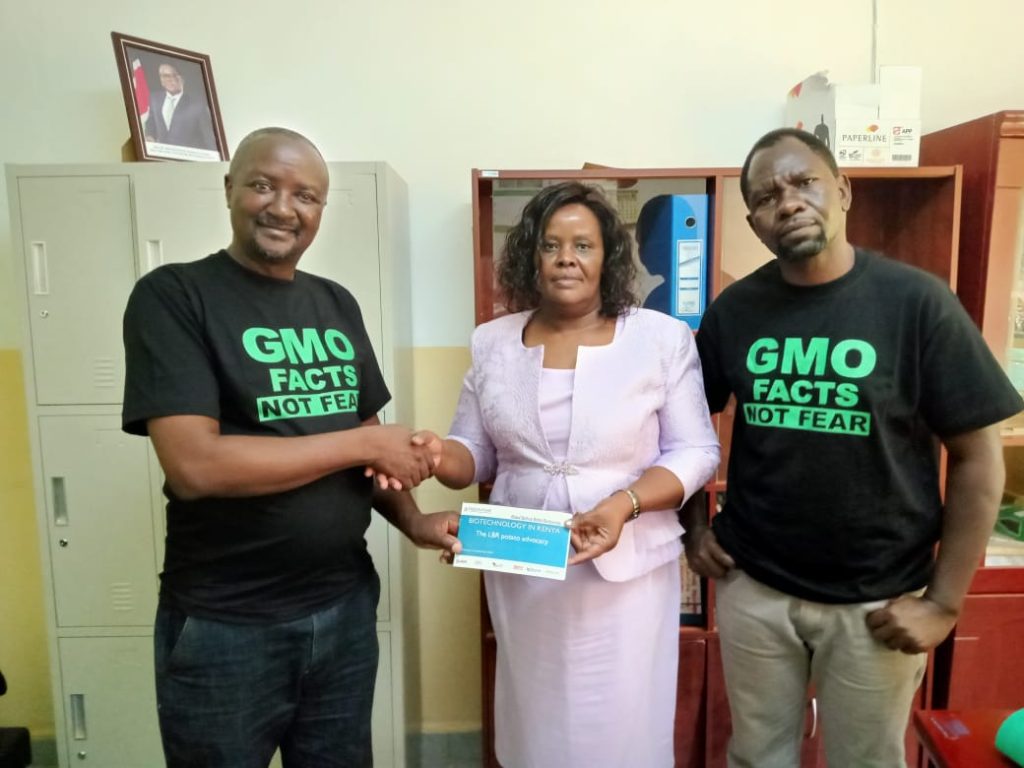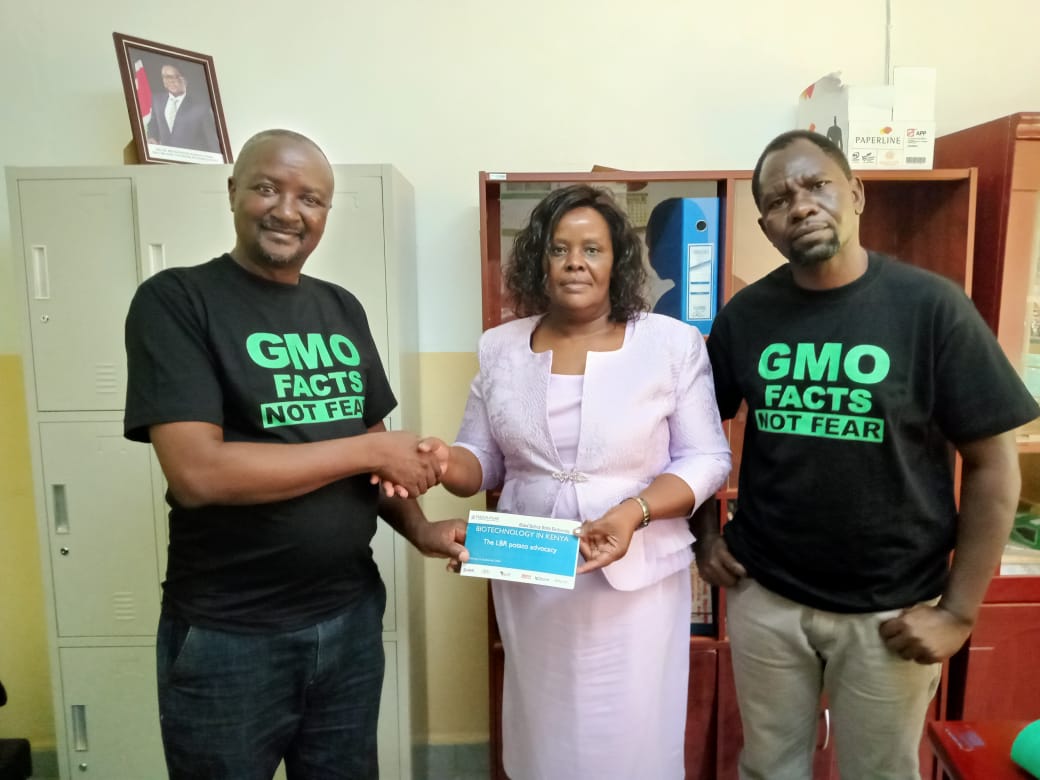Kenya’s journey with genetically modified crops (GMOs) has been full of twists and turns. Since the government lifted the GMO ban in 2022, many groups, including farmers, scientists, and activists have been debating whether GMOs are truly safe and whether the right laws are being followed in their development, marketing and consumption.
Over the past two years, courts have made several key rulings with some supporting the government’s move, saying everything was done according to the law, while others calling for caution, pausing GMO approvals and importation until more studies and public consultations are completed.

The GMO FACTS not FEAR Team Leaders presenting a pamphlet on GMO and Biotechnology to a Bungoma County Ministry of Agriculture Officer. This was in preparation for a potato farmers’ advocacy, education, and sensitization program in the Mt. Elgon region. Picture Credit: Kataru Concepts.
Here’s a simple summary of what’s happened so far and what it means.
Kenya’s Courts Still Divided on GMOs
Kenya’s courts have given mixed decisions about lifting the GMO ban. The Environment and Land Court, and the High Court said Kenya’s regulators had proper legal systems in place to handle GMO approvals. But later, the Court of Appeal and the High Court in Kisumu stopped some of the government’s actions through injunctions (temporary orders), pausing GMO maize importation, approval, and use. These decisions show that Kenya’s GMO debate is now about law, trust, and procedure, not just science.
A Short Timeline of Key GMO Rulings
October 12, 2023: The Environment & Land Court dismissed petitions that wanted to stop the government from lifting the GMO ban. It said the petitioners failed to show that regulators broke any biosafety laws and confirmed that Kenya already had proper systems for handling GMO approvals (Kenya Law).
November 7, 2024: The High Court, Nairobi said those issues in a case challenging the government’s decision had already been handled by the Environment and Land Court. The judges dismissed the new case, allowing the government to continue with its GMO policy. (Source: Nation Africa).
March 7, 2025: In the Court of Appeal, farmers and civil society groups including the Kenya Peasants League were seeking to stop GMO imports until their appeal was heard. The court agreed and ordered that GMO imports and commercialization be temporarily stopped until further notice (Kenya Law).
March 14, 2025: A few days later, the High Court in Kisumu issued another temporary order stopping KEPHIS and other government agencies from approving or handling GMO maize, citing possible threats to local maize varieties, soil health, and biodiversity (Kenyans.co.ke).
International Reactions
Reports from the USDA (United States Department of Agriculture) and other international agencies said these court decisions have paused Kenya’s GMO importation and commercialization while legal cases continue (USDA Report)
What This Means for Kenya
The courts are not saying GMOs are unsafe, they just want more research, public education and sensitization, and openness before Kenya moves forward. This is a reminder that the future of biotechnology in Kenya depends not only on scientists, but also on lawmakers, development partners in the GMO sector, farmers, and communities working together to build trust and understanding. In Simple Terms, Kenya’s judges are not deciding whether GMOs are safe or dangerous, they’ve left that for scientists to prove. Instead, the courts are looking at how the government made its decisions and whether the right laws and procedures were followed.
Here’s what it means in practice
- It’s About Law, Not Just Science: The courts mainly focus on process and fairness, not scientific experiments. Judges check whether the government followed existing laws like the Biosafety Act, respected people’s right to a clean and healthy environment, and allowed enough public participation before approving GMO crops. Some courts have said the people opposing GMOs didn’t show enough clear evidence that GMOs cause harm. Others have said the decision-making process itself might have been rushed or lacked enough environmental safeguards (Kenya Law).
- Procedures Matter a Lot: Kenyan judges take procedure very seriously. They often look at whether there were proper Environmental Impact Assessments (EIAs), public consultations, and compliance with all required regulations. If citizens or organizations show that officials skipped steps, or that potential harm to people or the environment could be serious and irreversible, courts are more likely to pause GMO approvals or imports until things are reviewed properly (Kenya Law)
- Court Outcomes Can Change: A case dismissed by one court doesn’t mean the story is over. If new evidence comes up, or if another group appeals, the case can go back to court where sometimes, judges then issue temporary orders (called conservatory orders) to stop further GMO activities until the case is heard fully. This is why Kenya’s GMO policy keeps shifting. Each new case can bring a fresh pause or clearance, depending on what’s presented in court (Kenya Law
What This Means for Pro-GMO Teams and Communicators
Kenya’s courts have made one thing very clear; “science alone is not enough” to win public trust or to roll out GMOs smoothly. Even if the research shows that GMO crops are safe, the public and the courts still want to see transparency, honest communication, and proof that proper procedures were followed. Regulators and pro-GMO advocates must not only have strong risk-assessment and safety systems, they must show them clearly, involve the public, and avoid shortcuts in every step.
Key Recommendations for Pro-GMO Teams
1 Scale Up Education, Sensitization, and Advocacy (This Is Non-Negotiable!)
i. Go beyond scientists and officials: Explain GMOs in simple language through local radio, TV, and printed materials. Translate content into Swahili and local dialects can help a great deal. Showing how GMO safety testing, regulation, and monitoring work in real life especially in farms and local markets will also contribute to the understanding and acceptance of the technology.
ii. Create real community conversations: Hold public barazas, farmer field days, and radio talk shows (especially on community stations in rural and peri-urban areas). During these sessions farmers and citizens should be encouraged to ask tough questions and get real answers, which helps avoid the common court claim that “the public was not consulted.”
iii. Share information openly: Post all regulatory reports, Environmental Impact Assessments (EIAs), and monitoring plans online and in local offices. Develop a simple FAQ sheet addressing the main fears around GMOs and the environment. The powerful social media platforms should be harnessed in the sharing and dissemination of information about biotechnology with the aid of animated content from the Scientific Animations Without Borders (SAWBO).
2. Expand Advocacy, Education, and Sensitization Beyond Single-Crop Projects
Kenya’s early GMO initiatives such as BT cotton, BT maize, and the late blight-resistant potato have shown that biotechnology can provide real solutions to persistent farming challenges, from pest control to disease resistance. However, focusing education and advocacy efforts on individual crops or limited pilot regions has left many communities uninformed and uncertain. This narrow approach has fueled public skepticism, as people outside the target areas often lack access to credible information about GMO safety, regulation, and benefits.
Future advocacy, education, and sensitization programs should therefore move beyond single-crop projects and isolated regions to become inclusive national campaigns. These efforts should engage all counties and communities, farmers, consumers, educators, and local leaders ensuring that every Kenyan has access to balanced, science-based information about biotechnology.
Such a national approach should present both GMO and non-GMO options, strengthen local seed systems, and integrate agroecological and integrated pest management (IPM) practices. It should also share transparent comparative data on each crop, including potential cross-pollination risks, biodiversity impacts, and market implications.
By expanding advocacy across the country, Kenya can foster informed public participation, bridge the gap between science and society, and demonstrate that GMO adoption follows a transparent, inclusive, and well-coordinated national roadmap.
3. Other High-Priority Actions
- Independent monitoring and reporting.
Set up or strengthen existing independent watchdog panel with farmers, civil society, and scientists. Let it publish plain-language updates on GMO impacts like soil health, seed flow, and market effects because courts respect independence and transparency. - Strengthen documentation of public participation and EIAs.
Before any GMO approval, there should be clear, public records, EIA summaries, community consultations, and official notices. Several judges have pointed out missing documentation as a reason to pause projects.
c) Build a clear compensation and co-existence system.
If a farmer’s field is affected (for example, through seed mixing or market loss), there should be quick help, compensation, support, or replanting programs.
Also, protect local maize and traditional seeds through buffer zones and seed-sharing programs (USDA Apps)
d) Open up data and local trials.
Make trial results public whenever it’s safe to do so and allow local universities and research centers to repeat GMO trials independently in different Kenyan regions.
This builds national trust in the science (Kenya Law).
e) Fix legal and policy gaps.
Work with Parliament, the Attorney General’s Office, and biosafety regulators to make sure laws are clear, especially around public participation, approval timelines, and emergency authorizations. Strong, transparent laws make it harder for opponents to win in court on technicalities.
f) Partner with smallholder and women farmers.
Include them from the start, not as an afterthought, and show how the technologies solve real problems, contribute to better yields, pest control, and increased income, and ensure they have fair access to seeds. This helps people see GMOs as a tool for empowerment, not as a top-down imposition.
Call to Action: Turning Knowledge into Trust
Kenya stands at a defining crossroads where science, law, and community must move forward together. At Kataru Concepts, through our “GMO FACTS not FEAR” campaign, we’ve been working tirelessly to make sure this journey is guided by truth, transparency, and inclusion.
From training over 500 digital community moderators to managing farmer WhatsApp groups across all 47 counties, to airing radio programs in Swahili and local dialects that debunk myths and explain scientific facts our focus has always been simple, “bridge the gap between scientists and the people who feed the nation” where we’ve reached approximately 20,000 potato farmers.
Through field days, barazas, podcasts, and farmer meetups, we’ve seen firsthand that biotechnology adoption is not just about scientific breakthroughs, it’s about human connection, dialogue, and trust. Farmers are asking better questions, local leaders are participating in evidence-based debates, and young people are using social media to counter misinformation with facts.
At Kataru Concepts Africa Farming Technologies, through our GMO FACTS not FEAR campaign, we believe Kenya can become Africa’s model for safe, inclusive, and trusted biotechnology, not through fear, but through facts. Let’s transform knowledge into trust and innovation into impact. Together, let’s make sure every Kenyan understands not just what biotechnology is, but why it matters.
James Kamuye Kataru is the CEO of Kataru Concepts Africa Farming Technologies and Team Leader of the GMO FACTS not FEAR education, sensitization, and advocacy team in Kenya.

